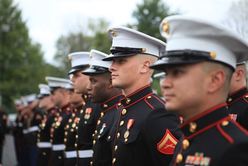 McKenzie Feldman Staff Writer Being a Marine is an experience that is extremely hard for a regular person to comprehend. What many people do not know is that one of the most challenging parts of war is actually coming home. Many families of war veterans can also testify to this, and personally, I can as well. My uncle, Lieutenant Colonel Jeremy Sibert, served two tours of duty. The first one was in Iraq, and the second one was in Afghanistan. When in Afghanistan, he worked with local tribes to set up the government so they could run on their own without the Taliban. Sibert joined the Marines because he felt a need to serve his country. However, what he would later endure was nothing that anyone could be fully prepared for. When joining the Marines, there is a process. After finishing up law school, he went to Officer Candidates School (OCS) in Quantico, Virginia and was a judge advocate for the Marines. While there, he was also trained to be combat ready. Sibert does not share much about Iraq but shared details of his surroundings in Afghanistan, “It is very biblical. There is not much in Afghanistan. It is very remote, hot, dry, and in the winter it is very cold. In the end, living in Afghanistan is about living or dying. If you do not grow your crops, you die. If you are in an insurgency controlled area, and you do not do what they tell you to do, you die.” Here in the United States, life is very much the opposite. Being part of a completely different world, veterans can explain why it is very hard to return home.
Sibert explains the struggles behind coming home, “You come home and you want things to be well, but at the same time it took me about a month and a half to realize I was not doing well. You are a little bit angry and anxious. You want to keep serving, and be with the guys you just left. You almost feel guilty about being back home. What you think is going to correct you is another deployment and to do your role again.” The sense of attachment many war veterans face just scratches the surface. Sibert explains further situations veterans face, “You do not sleep. When I first came back, I was getting about two hours of sleep each night. You are just up; your motor is still running. Also it is so quiet here. You do not have helicopters flying over you, jet sounds, or sirens. There is a new perspective in your life when you come back. Issues that seem very important or huge are very small and tiny compared to what you have just experienced. Not everything is life or death. Not everything is a quick reaction, but you are still in that mindset and your body just does not adjust that quickly.” Even though many military men and women suffer from these situations, Sibert explains that there are ways to cope with these struggles. “We have a plan. Part of that plan is to continue counseling, to get exercise every day, to enjoy certain activities, and to be creative. With this said, I have taken a cooking class, and I have started to take piano lessons again after quitting at nine years old. It will never go away. Your experiences and memories will always be there; the key is to learn from them and use them to your advantage.” Sibert also offered us something that is very important to take away. “If you see a service member and you thank them for their service, we always appreciate that. Also thank the person that they are with or thank their family. They are the ones that also have to sacrifice. They do not receive the recognition that they should.” Overall, there is so much hardship military men and women face when overseas. However, veterans find that the most challenging part can be coming home. There is so much that we can do as a community to show our appreciation. Thank you to all the men and women that protect and serve this country. Your bravery and love for your country is very much appreciated. Comments are closed.
|
Archives
March 2017
Categories
All
|

